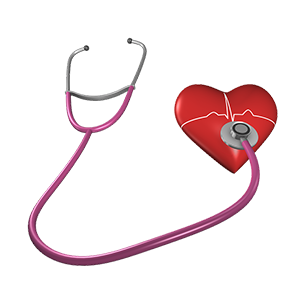Around 65 million Americans have high cholesterol, a condition that can affect anyone from young kids to senior adults. September is Cholesterol Education Month, and you can improve your health when you understand the definition of cholesterol and the best ways to prevent high cholesterol. 
What is Cholesterol?
Cholesterol circulates in your blood and resembles wax or fat. It supports metabolic processes, such as cell membrane stabilization, vitamin D formation, and steroid hormone and bile acid production. It While your body makes cholesterol naturally, it’s also found in food. If you make or consume more cholesterol than your body needs, the excess will accumulate in your arteries and narrow those passageways, which could increase your heart disease and stroke risk.
You have good cholesterol (HDL – high-density lipoprotein), bad cholesterol (LDL – low-density lipoprotein) and triglycerides. The lipoproteins carry cholesterol to and from your body’s cells.
- HDL – Removes bad cholesterol as it flows through your bloodstream.
- LDL – Becomes part of the plaque that lines your arteries.
Your cholesterol levels can depend on several factors, including a family history of heart disease, diabetes, or high blood pressure. Smoking, alcohol consumption, stress, and your weight can also affect cholesterol levels.
What are Normal Cholesterol Levels?
The ideal cholesterol level is under 170 mg/dL. Your LDL level should be under 110 mg/dL, and your HDL level should be over 35. Aim for a triglyceride level of under 150 mg/dL. While these numbers are confusing, your doctor can explain them and help you achieve healthy levels.
How do you know if you have High Cholesterol?
You might have high cholesterol and not know it. Visit your doctor for a blood test that shows your cholesterol levels. Typically, adults over the age of 20 should have their cholesterol checked every five years. High-risk children should have their cholesterol checked regularly, too.
How is High Cholesterol Treated?
Often, lifestyle changes can reduce your cholesterol levels. Your doctor may recommend exercise and dietary improvements, such as:
- Engage in two hours and 30 minutes of moderate exercise or one hour and 15 minutes of vigorous physical activity each week.
- Eat more high-fiber food, including fruits, vegetables and whole grains.
- Limit the amount of saturated fat and sugar in the foods and beverages you consume.
- Maintain a healthy weight.
- Quit smoking and lower your alcohol intake.
- Reduce stress.
Your doctor may prescribe medication, too. Statins reduce the amount of cholesterol your body makes and can lower your bad cholesterol levels.
This month, raise your cholesterol awareness levels. Visit your doctor for a cholesterol check, and discuss the steps you can take to achieve a healthy lifestyle that improves your health now and into the future
Read more
To be compliant by January 2020, California employers that have 5 or more employees must complete the mandatory training for employees.
Some highlights –
- Part-time, temporary and independent contractors MUST be included in the count of employees.
- Managers need at least 2 hours of training.
- At least one hour of training for non-managerial employees.
- Training must occur within 6 months of hire or promotion to managerial position.
- New businesses with 5 or more employees have 6 months to comply.
- Training can be individual or group based.
Read more at CDA.org
Read more
 Teenagers can be a valuable asset to your company. In addition to their youthful energy, teens bring their fresh perspectives and financial incentives to the table. Before you hire teens, consider these and other benefits that help you decide if teen employees are a good fit for your company.
Teenagers can be a valuable asset to your company. In addition to their youthful energy, teens bring their fresh perspectives and financial incentives to the table. Before you hire teens, consider these and other benefits that help you decide if teen employees are a good fit for your company.
Meet Seasonal Demand
When is your company’s busy season? Hire teens to help carry the load. They’re often eager to make extra money and can work flexible hours as they fill in where you need them and help you meet deadlines.
Gain a Tax Credit
Depending on where you live, you might qualify for a tax credit because you hire teens. You also may receive a tax break if you hire your teenage children to work for you.
Pay Fewer Benefits
Many eager teens willingly work for lower pay and fewer benefits than older employees, making them financially attractive for your company. You can even follow a Labor Department loophole that allows companies to pay workers under 20 years of age a subminimum wage of $4.25 an hour for the first 90 consecutive days of their employment.
Follow Teen Employment Law
Despite the financial savings, hiring teens does require you to follow protective federal and state laws. Check with your attorney for the details, but in general:
- Teens must be older than 14 to work in non-agricultural jobs.
- Teens who are 14 or 15 must work less than three hours a day, no more than 18 hours a week and no later than 7 PM while school is in session. In the summer months and on school holidays, they may work eight hours a day, 40 hours a week and no later than 9 PM.
- Teens who are 16 or 17 may work unlimited hours at a non-hazardous job.
Your company can benefit from teen employees. Simply follow the laws and enjoy the benefits of your young hires.
Read more

Spring cleaning does more than remove dirt and grime left over from winter. It also protects your house and reduces maintenance costs. So, try four spring cleaning tips this season as you cleanse your home.
1. Wash walls, windows and baseboards.
Often overlooked during weekly cleaning, the walls, windows and baseboards of your home harbor plenty of dirt and dust. Wash them at least once a year to ensure they look nice and to protect their finish.
*Move the furniture away from the walls, and wipe down the walls with a slightly damp cloth or magic eraser.
*The baseboards are also easy to wash off with a damp cloth. A toothbrush reaches into all the crevices.
*Use vinegar on the windows instead of glass cleaner to cut through accumulated dirt and prevent streaks.
2. Scrub the carpet.
Accumulated dirt, pet dander and odors can quickly ruin your carpets. Instead of merely running the vacuum each week, deep clean the carpets at least once a year. You can easily rent a carpet cleaner and do the job yourself or hire a professional cleaner as you prolong the life of your floors.
3. Care for furniture.
Modern or antique, your furniture will last longer when it’s free from dirt. Take time this spring to wipe off each piece from top to bottom. Use a soft cloth on wood to prevent scratches, and remember to spot treat dirty upholstery, flip the cushions and repair any tears or holes in the fabric.
4. Reduce clutter.
In addition to attracting pests and rodents, clutter reduces your ability to exit your home in an emergency. Commit to tossing or donating clutter like piles of books, excess furniture or anything you haven’t used in six months. Your home will thank you.
With these four spring cleaning tips, you’re able to reduce maintenance costs over time. So, look forward to protecting your home this season.
Read more

Agricultural workers are at a serious risk of injury or death when installing, climbing into, fumigating, entering, filling or emptying a silo. Because of the nature of the conditions present, workers may be exposed to hazards such as a lack of oxygen, toxic gases and grain entrapment.
To reduce worker risk of injury, properly train workers and remind them frequently of the following safety recommendations:
- Avoid entering a silo unless it is absolutely necessary.
- Complete tasks outside of the silo whenever possible.
- Have a coworker close by in case of an emergency.
- Never smoke or cause sparks near a silo, especially if the air humidity is low.
- Wear respiratory protection when appropriate.
- Stand at a safe distance when filling or emptying a silo.
- Use an approved fall restraint system and harness when climbing a silo.
- Ventilate a fumigating silo before entering.
- Conduct regular safety inspections of silos.
For more farm and ranch safety tips, contact Scurich Insurance today.
Read more

Continuity is critical in business, and there are few things more important than continuous revenue and cash flow, particularly for small to medium-sized organizations. In fact, just one brief business interruption can be incredibly costly for an organization, often leading to serious reputational damages or long-term closures.
That’s where business interruption insurance can help. This form of coverage provides protection against a variety of common interruptions, including natural disasters, equipment damage and vandalism.
Claims Scenario: You’re Fired
The company: A small, family-owned bagel shop.
The challenge: Following a recent fire, a bagel shop experienced major property damage. Not only were substantial repairs needed, the company lost crucial baking equipment.
Repairs for the damaged property and equipment were expected to take three months – a significant amount of lost time and revenue.
Business interruption insurance in action: Following a covered disruption, business interruption insurance can help businesses of all sizes stay afloat and recover quickly. This is because business interruption insurance can reimburse income organizations would have received had they been able to operate.
This was particularly important for the bagel shop, as paying for costly repairs and not having a steady flow of income could have bankrupted the business. With the right policy, organizations can take the necessary steps to get back up and running, all without sacrificing day-to-day income.
Claims Scenario: Relocation, Relocation, Relocation
The company: A mid-sized auto dealership.
The challenge: After a night of severe flooding, a number of area businesses experienced substantial water damage. Of these businesses, an auto dealership was hit the hardest, losing the majority of its inventory.
In addition, because the lot was flooded, the dealership had to move its operations to a new location. This, in turn, meant the dealership had to sign a new lease and cover steep moving expenses.
Business interruption insurance in action: In the face of a disaster or other disruptions, organizations may be forced to move locations in order to remain open. Without the proper policy, organizations would have to pay for these costs out of pocket.
Thankfully, business interruption insurance can reimburse organizations for all of the costs associated with a move.
Benefits of Business Interruption Insurance
- Revenue – In the event of a disruption, business interruption insurance provides coverage for income your business would have earned during a closure period if it had been operating normally.
- Rent or lease payments – Even if your premises are unusable following a disaster or other event, many leases still require that you make payments. Business interruption insurance allows you to continue making rent or lease payments, even while your business is not operating.
- Relocation – In the event that your primary location is unusable following a disaster or other event, you will likely have to relocate in order to remain open and continue generating revenue. Business interruption insurance can cover the expenses of moving your business to a temporary location and may include both moving and rent costs.
- Employee wages – If you are unable to operate, it is likely you will not be able to continue paying employees. Business interruption insurance can help you avoid losing staff while you’re closed by ensuring that you make payroll.
- Loan payments – If you have an outstanding loan, you will need to continue to make payments even if your business isn’t fully operational. Business interruption insurance will ensure you never miss a payment until you are fully operational again.
Read more


 Teenagers can be a valuable asset to your company. In addition to their youthful energy, teens bring their fresh perspectives and financial incentives to the table. Before you hire teens, consider these and other benefits that help you decide if teen employees are a good fit for your company.
Teenagers can be a valuable asset to your company. In addition to their youthful energy, teens bring their fresh perspectives and financial incentives to the table. Before you hire teens, consider these and other benefits that help you decide if teen employees are a good fit for your company.

